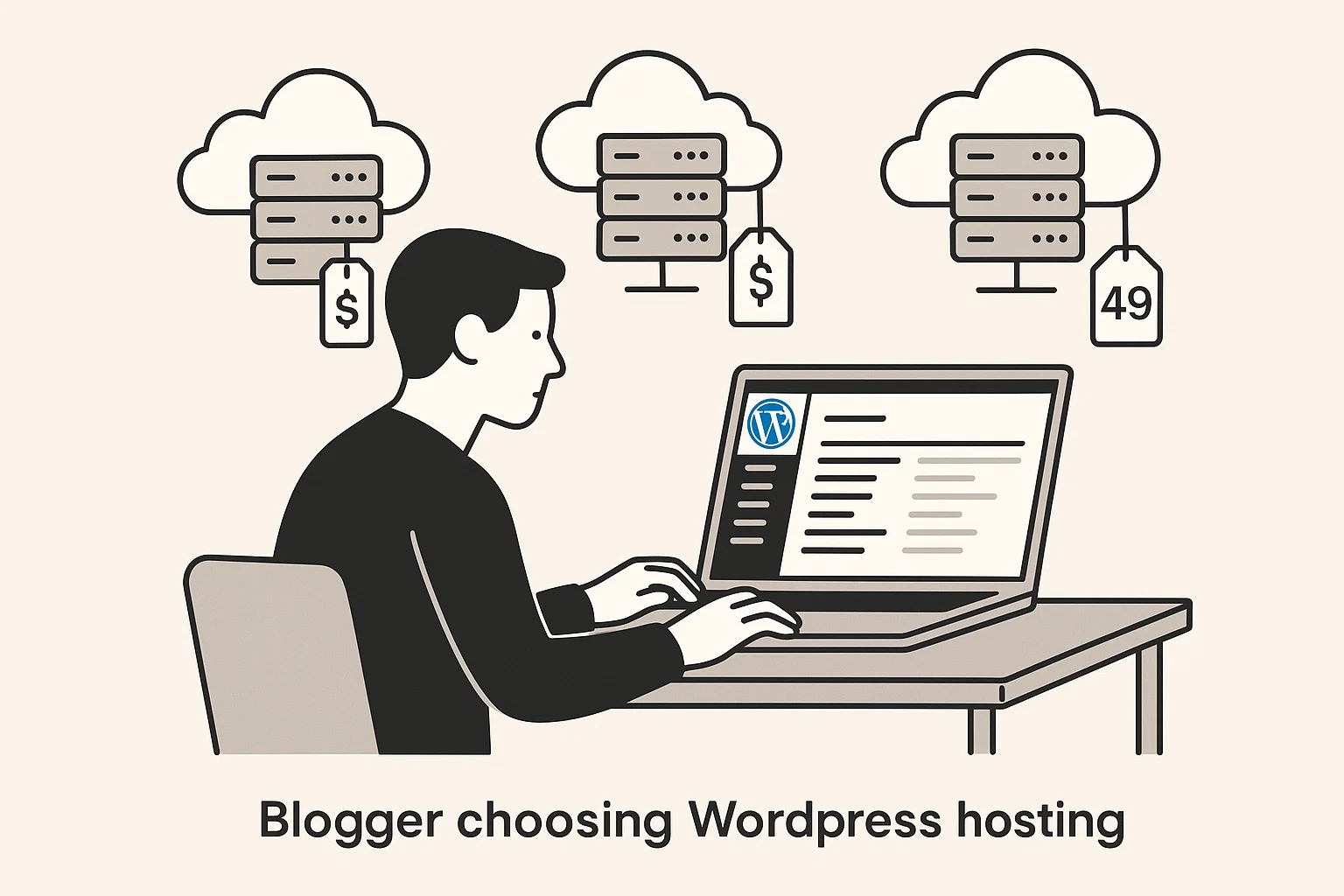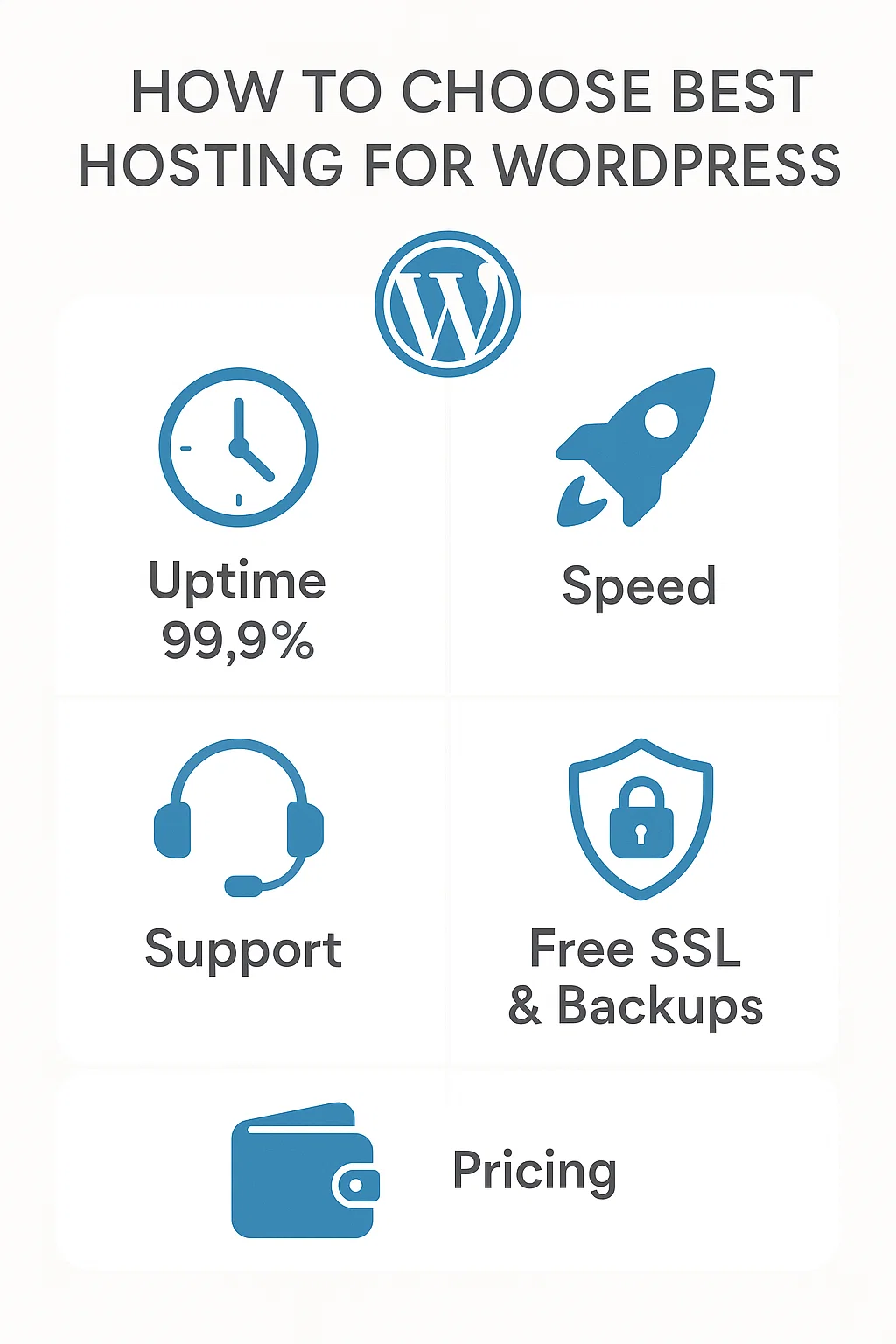
So if you’re scratching your head wondering “How to choose the best hosting for WordPress?”, you’re in the right place. I’ll break it down without tech jargon, share real blogger lessons, and give you a simple checklist you can follow before spending a single dollar.
Why Hosting Matters More Than You Think
Imagine this: you finally set up your blog, you publish your first posts, maybe even get a few readers. Then boom, the site crashes. Or it loads so slowly that people click away before reading a word. Trust me, nothing kills motivation faster.
Hosting is the foundation. Good hosting means:
Your site is online 24/7 (not down when visitors arrive).
Pages load quickly (Google loves this, so does your audience).
Security is handled (so you don’t lose sleep over hackers).
You get proper support when something breaks.
Bad hosting? Well, let’s just say it’s like building a house on sand, it won’t last.
What Is WordPress Hosting?
At its core, hosting is simply renting space on the internet to store your website. When people type your domain, hosting delivers your site to them.
But here’s where beginners get confused: you’ll see terms like WordPress hosting, shared hosting, managed hosting, cloud hosting, and you wonder, what’s the difference?
WordPress Hosting just means the server is optimised for running WordPress smoothly. It usually comes with one-click WordPress installs and sometimes extra features like automatic updates.
General Hosting works too, but you may need to tweak settings yourself.
If you’re a beginner, WordPress hosting is usually a safe bet. It’s beginner-friendly and removes a lot of headaches.

Types of Hosting for WordPress (Explained Simply)
Let’s cut through the noise. Here are the main hosting types you’ll come across:
Shared Hosting
This is like living in a hostel. You share resources (CPU, memory, bandwidth) with many other websites. It’s cheap, often under $5/month. But if one site eats too many resources, everyone else suffers. Good for beginners, but not for big traffic.
Pros: Cheapest, easy to start.
Cons: Slower, less secure, not good for scaling.
VPS Hosting
Think of this as renting your own apartment in a big building. You still share the building, but your room is private. Performance is better, more control, and it suits growing blogs.
Pros: Faster, scalable, good for medium traffic.
Cons: More expensive, some technical setup.
Managed WordPress Hosting
This is like having a personal assistant. The host takes care of WordPress updates, backups, security, and speed optimisations. You focus on content, not tech.
Pros: Stress-free, fast, highly secure.
Cons: Higher cost, less control if you’re tech-savvy.
Cloud Hosting
Imagine multiple houses all connected, if one breaks, others keep things running. Cloud hosting spreads your site across several servers, so downtime is rare. It’s powerful but still affordable these days.
Pros: Reliable, scalable, great for growing sites.
Cons: Pricing can be tricky if traffic spikes.
How to Choose the Best Hosting for WordPress
Alright, here’s the meat. These are the must-check points before buying hosting:
1. Uptime and Reliability
If your site is down, you’re losing visitors and money. Look for 99.9% uptime guarantees. Anything less is a red flag.
2. Speed and Performance
Google has made speed a ranking factor. Choose hosts that use SSD storage, caching, and ideally offer a CDN (Content Delivery Network). Fast hosting = better SEO + happy readers.
3. Customer Support
At some point, you’ll break something, it happens to all of us. That’s when 24/7 support is gold. Live chat > email tickets. Beginners especially need quick hand-holding.
4. Scalability
You might start with 100 visitors a day, but what happens when you hit 10,000? Your hosting should let you upgrade easily without moving your site.
5. Price vs Value
Cheap looks tempting, but beware of “$2/month” traps. Renewal prices often jump to $10–15/month. Always check the fine print.
6. Free SSL & Backups
SSL (that little padlock in the browser) is a must for trust and Google rankings. Backups save your life if your site crashes. Good hosts include both for free.
Common Mistakes Beginners Make
I’ve seen these over and over:
Choosing the cheapest plan blindly. If it’s too good to be true, it probably is.
Ignoring renewal pricing. First year cheap, second year shock!
Not checking WordPress compatibility. Some hosts don’t have one-click installs, making setup a nightmare.
Forgetting about support. Trust me, good support can save your blog.
How to Switch Hosting on WordPress
Already stuck with bad hosting? Don’t worry, you can switch. Here’s the quick version:
Backup your WordPress site (files + database).
Choose a new host.
Ask if they offer free migration (many do).
Update your domain’s nameservers to point to the new host.
Test everything before cancelling the old one.
It sounds scary, but honestly, it’s like moving houses, once done, you wonder why you didn’t do it earlier.
Best Hosting Providers for WordPress (2025 Picks)
Without turning this into an ad, here are names I trust and have seen beginners succeed with:
Hostinger – Budget-friendly, easy for beginners, strong performance.
SiteGround – Amazing support, reliable uptime, beginner-friendly tools.
Bluehost – Officially recommended by WordPress, great for first-time bloggers.
Cloudways – Powerful cloud hosting without deep tech knowledge.
WP Engine – Premium managed hosting for serious bloggers and businesses.
Each has pros and cons, but you can’t go wrong starting with Hostinger or SiteGround if you’re new.
Best Hosting Providers for WordPress (2025 Picks)
Without turning this into an ad, here are names I trust and have seen beginners succeed with:
Hostinger – Budget-friendly, easy for beginners, strong performance.
SiteGround – Amazing support, reliable uptime, beginner-friendly tools.
Bluehost – Officially recommended by WordPress, great for first-time bloggers.
Cloudways – Powerful cloud hosting without deep tech knowledge.
WP Engine – Premium managed hosting for serious bloggers and businesses.
Comparison of WordPress Hosting Providers
| Hosting Provider | Starting Price (2025) | Best For | Key Pros | Possible Cons |
|---|---|---|---|---|
| Hostinger | $2.99/month | Beginners on a budget | Affordable, fast, free SSL, one-click WordPress install | Renewal prices higher |
| SiteGround | $3.99/month | Bloggers who want support | 24/7 live chat, strong uptime, daily backups | Slightly higher cost after first year |
| Bluehost | $2.95/month | First-time WordPress users | Official WP partner, free domain for 1 year, easy setup | Can get slower on heavy traffic |
| Cloudways | $11/month | Growing sites, tech-curious users | Cloud performance, scalable, flexible plans | No free domain, learning curve |
| WP Engine | $20/month | Serious bloggers & businesses | Fully managed, high security, premium performance | Pricey for beginners |
Quick Checklist Before You Buy Hosting
Here’s your simple hosting shopping list:
99.9% uptime guarantee
Free SSL certificate
One-click WordPress install
Free backups (or easy restore)
24/7 live chat support
Clear renewal pricing
Option to scale (upgrade plan)
If your host ticks all these boxes, you’re in safe hands.
Free vs Paid WordPress Hosting – Is Free Worth It?
This question pops up a lot: how to choose best hosting for WordPress free?
Free hosting exists (WordPress.com, 000webhost), but it comes with strings attached:
Ads on your site
Limited storage and bandwidth
No custom domain (yourblog.theirname.com)
No real support
Free hosting is fine if you’re just experimenting or learning. But if you’re serious about blogging or business, go paid. Even $3–5/month makes a world of difference.
So, The Hosting Choice That Builds Your Future Blog
Your hosting isn’t just a bill, it’s the foundation of your online journey. Pick the wrong one, and you’ll be frustrated. Pick the right one, and you’ll have a smooth ride where you focus on content and growth, not downtime and support tickets.
Start small, but smart. Don’t overpay, but don’t undercut your blog’s future either. And when in doubt, revisit the checklist above before hitting “Buy.”
If you’re ready to launch, pair good hosting with solid tools like a Paraphrasing Tool to polish your content, and you’ll be way ahead of most beginners who quit within months.
Your future blog deserves a strong home, choose wisely, and you’ll thank yourself later.

Chris Digital, tech enthusiast and digital marketer, shares insights on WordPress, SEO, Adsense, online earning, and the latest in graphics and themes.